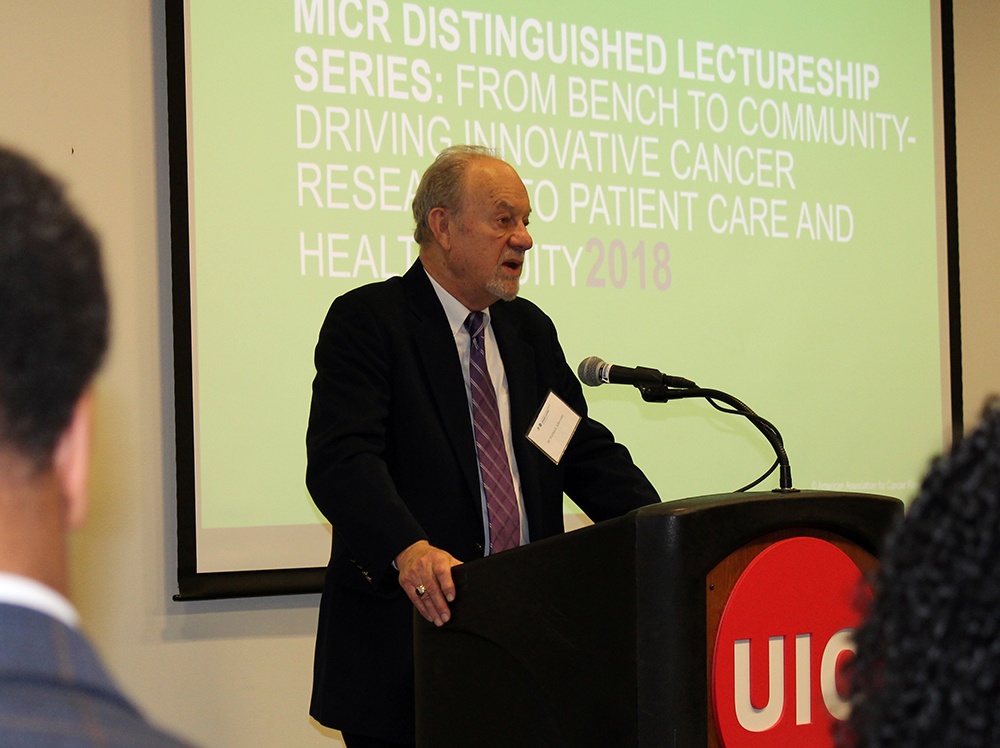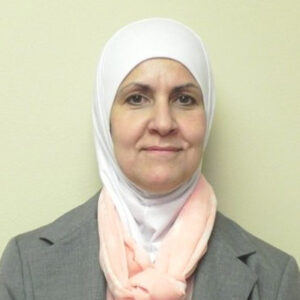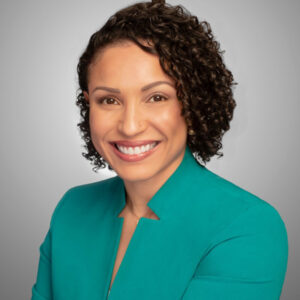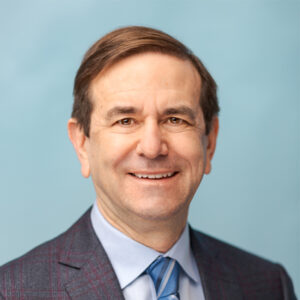Richard B. Warnecke, PhD, a longtime member of the University of Illinois Cancer Center and a national leader in cancer control research, died Aug. 19. He was 84.


An ally before allyship was popular. A cancer health disparities researcher long before the topic became a research category among federal agencies. For over 40 years, Warnecke was a pioneer, a mentor of mentors–and architect of the Multilevel Model for Analysis of Health Disparities that grounds much of our work and research today—The Warnecke Model.
But more than a logic model, the Warnecke Model can also be used to summarize (or to encompass) his approach and way of life. A scholar beyond his time, Dr. Warnecke represents a modern-day William Lloyd Garrison, who chose to use his position to help develop the next generation of cancer health disparities researchers.
Most exemplary, in 1992, Warnecke began a federally funded Cancer Education and Career Development training program for doctoral students and postdoctoral fellows in multidisciplinary cancer control and prevention research, now in its 30th year. This program was influential in launching the careers of many researchers who followed in his footsteps to address health disparities. He made a special effort to recruit and mentor junior investigators from underrepresented minority groups.
“Beyond the millions of dollars in NIH funding, hundreds of publications, and multiple centers of excellence, the legacy of the Warnecke Model is most palpable through the countless researchers that stem from his academic tree,” said Katherine Y. Tossas, PhD, an assistant professor at the Virginia Commonwealth University and the Massey Cancer Center, an underrepresented minority early-stage investigator, and a former participant of Warnecke’s T32 legacy program. “I am proud to be one of those researchers.”
Early in his career, Warnecke’s research centered on the cancer information needs in Illinois, data systems, and cancer surveillance methods that strongly influenced the creation of the state cancer registry in the mid-1980s—a vitally important resource to both practitioners and researchers, and key to helping monitor its progress in reducing cancer’s toll.


Warnecke next turned his attention to the considerable problem of smoking among low-educated women, given that more women die from lung cancer than from any other cancer. With a collaborative group of multidisciplinary investigators, Warnecke led a team to develop a set of novel approaches to help women stop smoking.
Warnecke, professor emeritus of epidemiology, public administration, and sociology at the University of Illinois Chicago, sustained a continuous and high level of funding from the National Cancer Institute (NCI). He was particularly skillful in conducting large-scale, multiple-component, community-based investigations, consisting of two program projects—Community Interventions for Cancer Prevention (1986-1992) and Strategies for Smoking Cessation Among Low Educated Women (1993-1998).
In his distinguished career, Warnecke published more than 100 peer-reviewed scientific papers along with several book chapters and garnered more than $40 million in NIH funding focused on addressing health disparities.
Although he officially became an emeritus professor in 2007, Warnecke remained actively involved in his pursuit of cancer prevention, and he was continually pursuing innovative research ideas to help improve the lives of those at-risk.
As director of the Health Policy Center, Institute for Health Research and Policy, and associate director for Population Health, he led three center grants—the Center for Population Health and Health Disparities (2003-2015) and the Center for Excellence in Eliminating Health Disparities (2009-2015). Warnecke also served on UI Cancer Center’s NCI ChicagoCHEC (Chicago Cancer Health Equity Collaborative) Internal Advisory Committee and on the ACS-Illinois Cancer Health Equity Research Center grant Community Advisory Board.
Utilizing the two center grants, Warnecke’s team of researchers worked to better understand why Black women with breast cancer are more likely than their white counterparts to be diagnosed with late-stage, high-grade disease and more aggressive subtypes of breast cancer.
The legacy of the Warnecke Model is most palpable through the countless researchers that stem from his academic tree.
Katherine Y. Tossas
The investigations examined multiple potential levels of influence on these disparities, including neighborhood health resources, level of neighborhood social integration and support, and whether patient navigators can improve the timing and quality of treatment of poor women with breast cancer. Warnecke and his colleagues also conducted genetic analyses to help understand these disparities between Black and white women in disease stage and outcomes.
After earning degrees from Cornell University (Bachelor of Science in Industrial Relations, 1959), Colgate University (Sociology, 1963), and Duke University (Sociology, 1966), and completing a postdoctoral training program in Sociology & Anthropology at Duke (1967), he spent several years on the faculty at the State University of New York at Buffalo before moving to UIC. In 1982, Warnecke was appointed director of the UIC Survey Research Laboratory (SRL) and professor of sociology, College of Liberal Arts and professor of epidemiology and biostatistics, School of Public Health.
Warnecke, who served as associate director of the UI Cancer Center’s Population Sciences, Cancer Control and Education program, was the recipient of numerous accolades. Among the awards was a gift he received from former UI Cancer Center Director Dr. Robert Winn (currently director and Lipman Chair in Oncology at VCU Massey Cancer Center), at an event at UIC sponsored by the American Association for Cancer Research Minorities in Cancer Research annual meeting in 2018. The award recognized Warnecke’s tireless work in cancer disparities research.
“Dr. Warnecke’s legacy will live on through the countless lives saved due to his work and the hundreds of students, trainees, faculty, and staff who have been touched by his experience, mentoring, wisdom, and generosity of heart,” said Jan Kitajewski, PhD, University of Illinois Cancer Center director and Sweeney Professor of Basic Sciences and head of UIC College of Medicine’s Department of Physiology and Biophysics.
Timothy Rebbeck, PhD, Vincent L. Gregory, Jr. Professor of Cancer Prevention at the Harvard TH Chan School of Public Health and professor of medical oncology at the Dana-Farber Cancer Institute, assisted Warnecke on health disparities research and co-authored studies published in high impact journals.
Warnecke, Rebbeck said, was a “valued colleague. Dr. Warnecke was not only a brilliant and creative researcher, but he was also a valued and trusted friend. It was always a pleasure to talk with him at meetings; his wisdom and insight made for a meaningful contribution to the collaborative science we worked on together.”
Electra Paskett, PhD, professor, Marion N. Rowley Chair in Cancer Research at The Ohio State University’s College of Public Health, said she was saddened to hear of Warnecke’s death, as “Dick was a good friend and colleague for more than 30 years.
“Dr. Warnecke was a pioneer in disparities work as he led our Center for Population Health and Health Disparities in developing the Multilevel Model for Analysis of Health Disparities, lovingly referred to as the Warnecke Model,” said Paskett, whose research program is nationally recognized for studying cancer health disparities. “This contribution will place him forever in our research, minds, and voices as we carry on to strive for health equity. I will miss seeing him at meetings, talking with him, and his unique and visionary perspective on research, as well as hearing of his travel stories.”
Warnecke is survived by his wife Barbara, their two children Mark Warnecke and Elizabeth Warnecke Devaney, nine grandchildren, and one great-grandson.
Services will be held at First Presbyterian Church of Evanston, 1427 Chicago Avenue, Evanston, Illinois., on Sept. 10, 2022 at 4 p.m. A reception will follow the service. For additional information please visit https://cancer.uillinois.edu.
The authors are:
Sam Hostettler
Associate director, communications,
University of Illinois Cancer Center
Ahlam Al-Kodmany, PhD
Associate director, administration,
University of Illinois Cancer Center
Katherine Y. Tossas, PhD, MS
Assistant professor,
Harrison Endowed Scholar in Cancer Research,
Department of Health Behavior & Policy,
School of Medicine, Virginia Commonwealth University
Robert A. Winn, MD
Director and Lipman Chair in Oncology,
VCU Massey Cancer Center; Senior associate dean, cancer innovation,
Professor, pulmonary disease and critical care medicine, VCU School of Medicine
Jan K. Kitajewski, PhD
Director, University of Illinois Cancer Center;
Professor and head,
Department of Physiology and Biophysics












